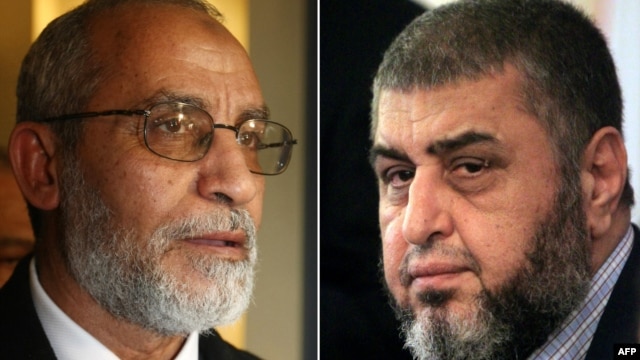
A combo shows Khairat el-Shater (R), then presidential candidate of Egypt's Muslim Brotherhood, on April 9, 2012 and Mohammed Badie (L) at a news conference in Cairo, January 16, 2010.
CAIRO — Egypt's top prosecutor has ordered the arrests of top Muslim Brotherhood leaders, even as the country's interim prime minister starts to reach out to the group to form a transitional government. Street protests appear to have dwindled dramatically in size Wednesday as most ordinary Egyptians began fasting for the Muslim holy month of Ramadan.
Egypt's interim Prime Minister-designate Hazem el-Beblawi met with top political figures Wednesday amid hopes of putting together a new government, quickly. Islamists as well as the main National Salvation Front oppose parts of a draft plan to restore democracy, including steps to amend the constitution.
A spokesman for interim President Adly Mansour said that all parties, including the Muslim Brotherhood's Freedom and Justice Party and the Salafi Nour Party, would be offered posts in the new government.
However, a top figure in the Freedom and Justice Party, Mohamed Kamal, declared that his group would not participate in the new government.
Another prominent Muslim Brotherhood figure, Essam el Erian, says his party wants no part in the government, and demands that ousted President Mohamed Morsi be reinstated.
Newly appointed General Prosecutor Hisham Barakat, however, has issued warrants for the arrest of the Brotherhood's Supreme Guide Mohamed Badie, as well as Essam el Erian and Mohamed Baltagi. Authorities also have arrested 260 Brotherhood supporters for questioning over Monday's shootout near a Cairo military complex.
With the start of the Muslim holy month of Ramadan, much of the crowd of Brotherhood supporters demonstrating in front of Cairo's Rouba Adawiya mosque appears to have left. Less than a thousand demonstrators remained in Cairo's Tahrir Square.
The Egyptian press reported that Saudi Arabia and the United Arab Emirates have pledged to donate a combined $8 billion in aid to help the ailing Egyptian economy get back on its feet. Riyadh will also give quantities of petroleum products to help ease a chronic fuel shortage. |
|
